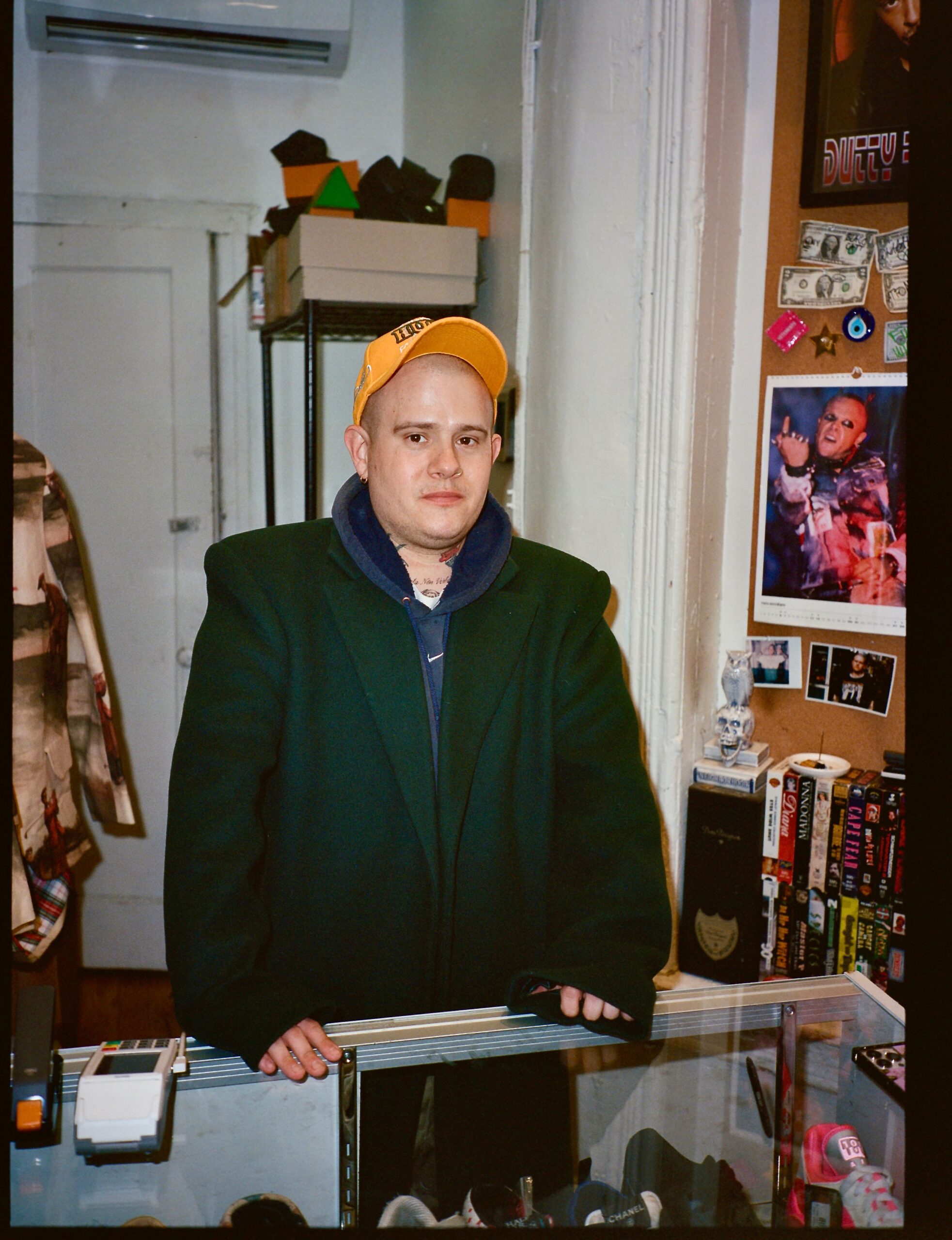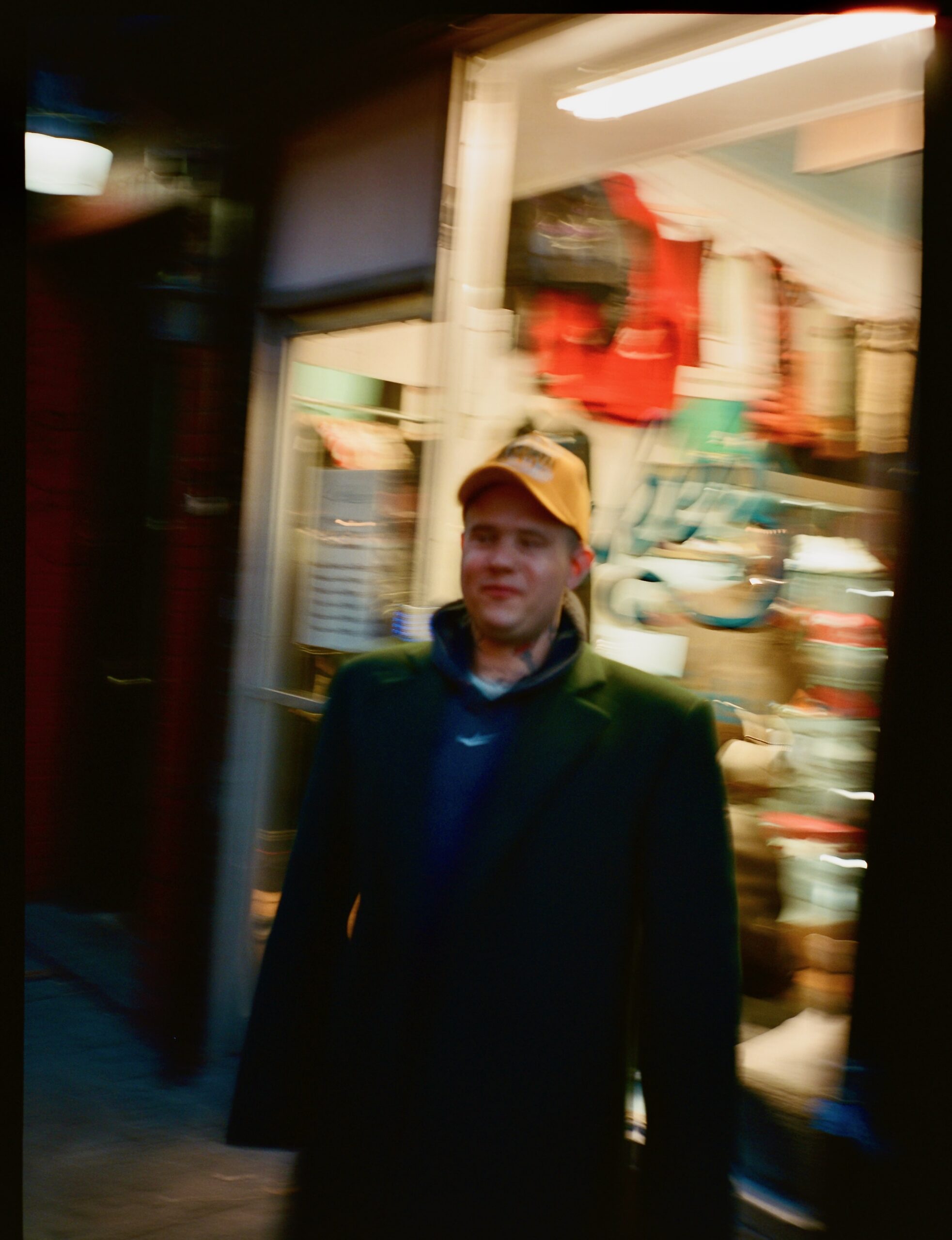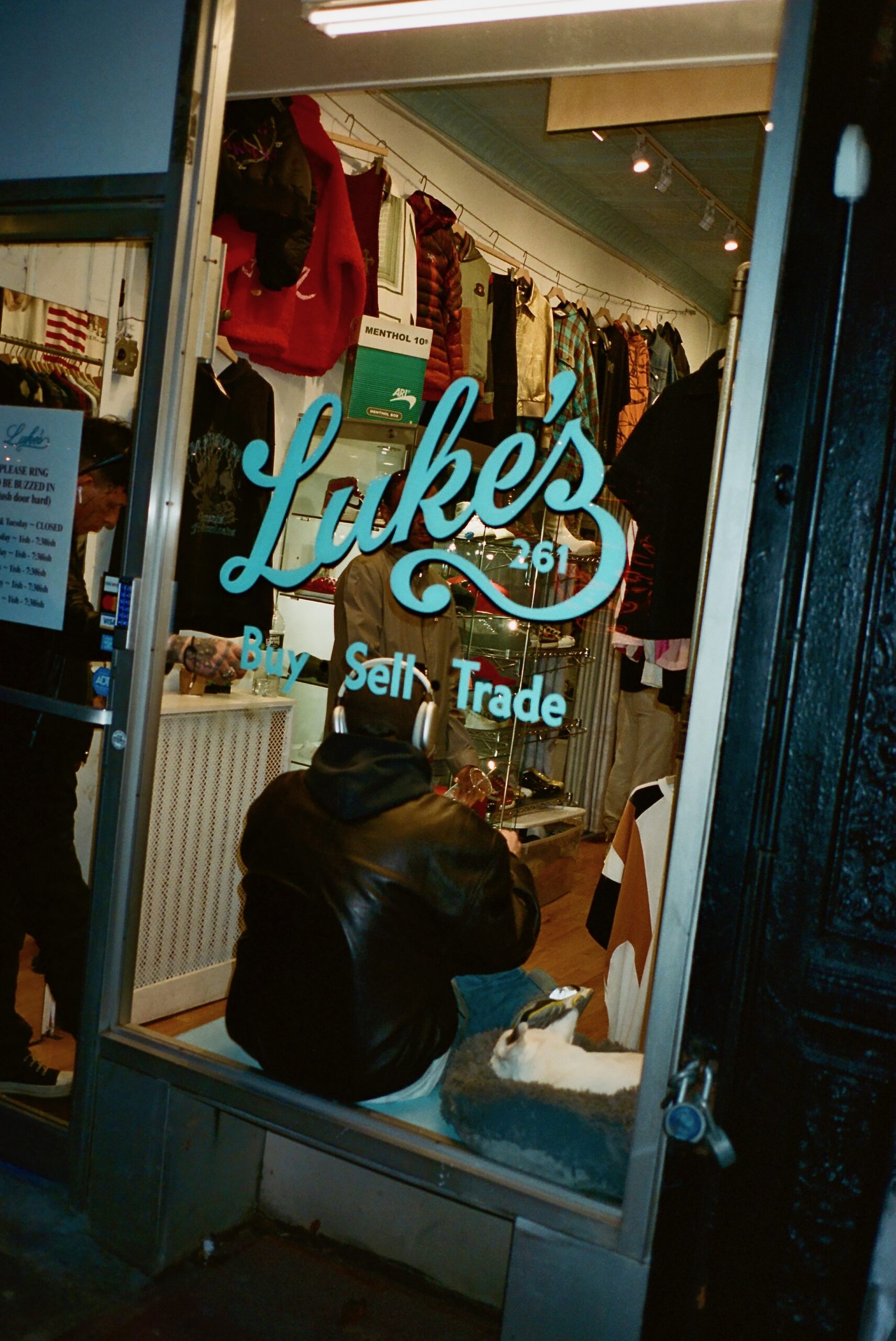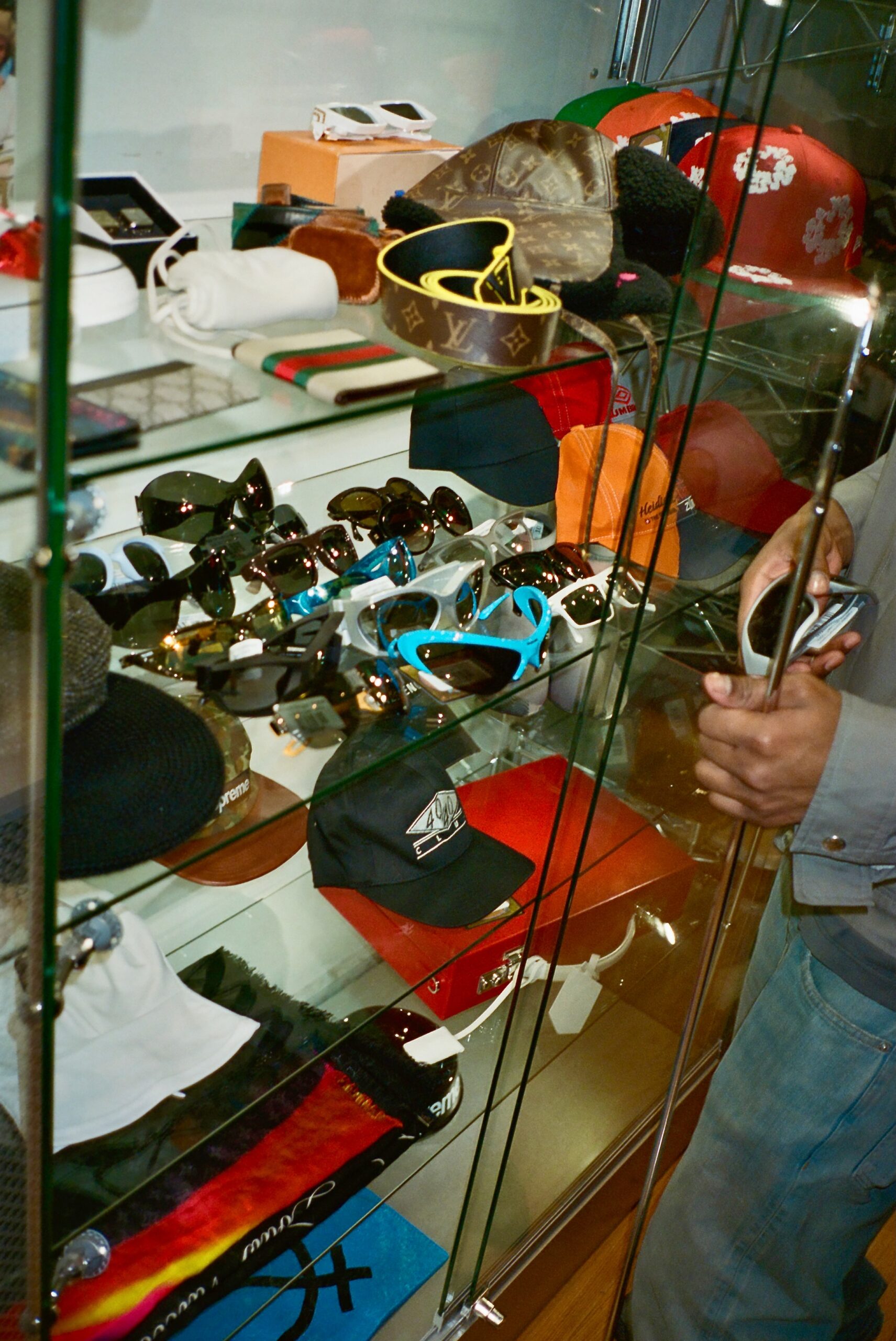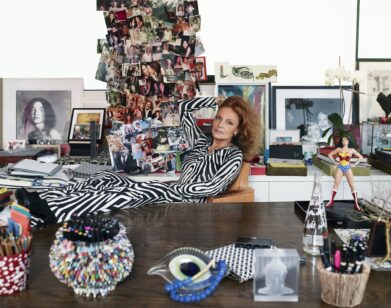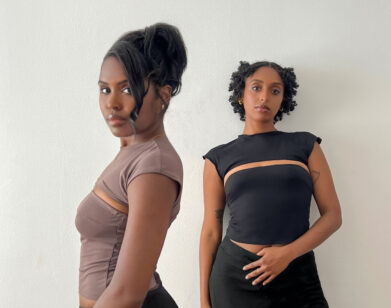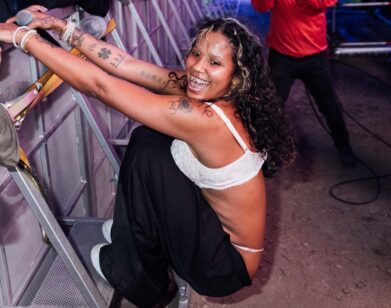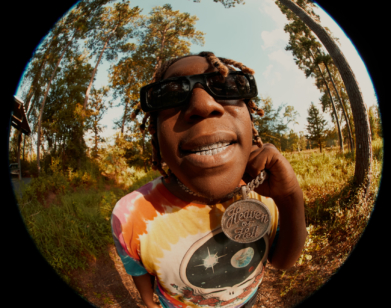MERCHANT
How Luke Fracher Went From Selling Pot to High-End Vintage
I don’t remember when I first met Luke Fracher, but I was instantly struck by his attitude, approach, and sense of humor. Maybe it’s his Southern roots, but Fracher is forthcoming and thoughtful but unserious, a rare combination in his line of work. Fracher was early in the resell business, co-founding the pioneering boutique Round Two, and his experience shows. Luke’s—his storefront on Broome Street, which opened in 2022—is a jewel box stuffed to the gills with men’s vintage and contemporary clothing and runs the gamut from Vetements and Louis Vuitton to Prada and Bottega Venetta. His Instagram, where he writes hilarious, spot-on captions for select garments and stars in a long-running video series in which he waxes poetic on camera, is a real selling point. Shopping should be fun, and Fracher knows that. I was in Los Angeles, and Fracher was in New York City, so we chatted on Zoom (camera off) about selling drugs, Rick Owens pants, and passing on his knowledge to the next generation.
———
CHRIS BLACK: Dude, have you been to Australia?
LUKE FRACHER: Nah.
BLACK: It’s amazing. It’s truly paradise, and I think it gets a bad rap in America because the ones who leave come to New York and LA and open bad brunch restaurants.
FRACHER: Yeah. But I like Dudley’s, for the record.
BLACK: Do you?
FRACHER: It’s pretty good.
BLACK: It’s not bad. But also, you have to like it. It’s your neighbor.
FRACHER: But it’s LES [Lower East Side] Applebee’s at the same time.
BLACK: If Dudley’s is LES Applebee’s, then what does that make you?
FRACHER: The LES Cracker Barrel Gift Shop.
BLACK: I guess we should get into how you started doing this. I know the backstory to some extent, but you’re not just a new YouTube and TikTok star. You’ve been in the game for years.
FRACHER: I’m a YouTube and TikTok stalwart. Where do you want to start?
BLACK: Let’s start at the beginning, bro.
FRACHER: Okay. I had been working in retail since I was 15 in a sneaker store. I Moved to Richmond for school, was selling pot, got caught up, or my people got caught up, and I had to stop doing it.
BLACK: You mean you lost your plug?
FRACHER: My plug got caught up. I had fucking sold him a gun that I bought at a gun show. He got caught in California with it. I had to use my savings from when I graduated college to retain a lawyer because I was fighting an ATF case.
BLACK: Wait, did you beat the charges?
FRACHER: Well, I never got charged because I knew that this fool was mad irresponsible, so I had him sign one of those gun—
BLACK: Yeah, yeah. Like a waiver.
FRACHER: Yeah, exactly. To say, “you’re not going to murder somebody.”
BLACK: You’ve been using your head for a long time. I do see a through line from sneaker store to weed-selling to selling vintage.
FRACHER: We started Round Two in 2013. Sean [Wothesrspoon] and Chris [Russow], it was kind of their thing. They brought me on, but I had retail experience. After college, I was working at DTLR, which is a sneaker store. I was working seven days a week. I was working four days at DTLR in Richmond, and then three days at the Gucci Women’s Handbag section in the Saks Fifth in Richmond.
BLACK: Damn, you really earned it, bro. That’s some chops right there.
FRACHER: The duality of man. We started the first Round Two in 2013, moved to L.A. in 2015. Lived in L.A. until mid 2017. COVID kind of fucked a bunch of things up and I wasn’t super happy. I left in maybe August of last year and then opened the store here in December of last year.
BLACK: Did you just see a hole in the market? Did you just want to be in New York?
FRACHER: I love L.A. Obviously, I like New York more, even though it’s more taxing. I got a really good deal on a spot, which, you’ve been at the spot. It’s fucking tiny. Also, I thought that it made a lot more sense to build the business out here than in L.A. because I have a much bigger network in New York. I was like, if I can fucking crush it in New York, I can go anywhere, especially L.A.
BLACK: For sure. You could always come back. The way you approach it, as a friend and customer, is very fun. I think that that’s also a big part of the hook because with a lot of this stuff, it’s guys trying to be serious and tough. I’m like, we’re talking about clothes. This should be fun.
FRACHER: What I always tell people is, at the end of the day, what I do does not benefit society at all. I have no illusions that what I do means anything to anyone long-term. I’ve never worked seriously in the actual fashion industry. I’ve always been in a weird place where people who work in the industry don’t really want to say “what up?” to me in front of their fashion friends, but they’ll come kick it with me and sell me shit when no one is around, right? I’ve always kind of looked at the fashion industry as a joke because I don’t really fuck with those politics and, mainly, because I feel excluded.
BLACK: And the store is tiny, but it feels old school. There’s always people in there. It’s humming.
FRACHER: How many fucking stores do we walk into in New York or L.A. and no one’s been in all day?
BLACK: No one’s in there.
FRACHER: You talk to the person at the counter and they’re a third of the way through a four-hour YouTube video.
BLACK: Exactly. But you have always done on-camera stuff, and that helps sell clothes, I’m sure.
FRACHER: My ultimate goal is to be on TV or do some sort of media shit. I like being on camera. I talk to people all day anyway. The idea when we started the store, to be candid, was that if we can build a cult of personality around this, it’s going to be beneficial in more ways than one, and more ways than just sales.
BLACK: I completely agree. In theory, what you’re selling is very broad, and maybe you could go get it all somewhere else. But you make it more fun, so I would rather buy it from you.
FRACHER: Ostensibly, most of this stuff is available online or somewhere else. But there’s nowhere else in the world that I’ve been to where the curation of all this stuff is in one place.
BLACK: Agreed. It’s a one-stop shop versus having to spend your days finding things.
FRACHER: Even back to when I was selling pot, good work sells itself. All you have to do is facilitate it.
BLACK: What’s the clientele like? Because I’ve been in the store several times, I feel like it really is every kind of person.
FRACHER: I would say my clientele, more so than almost anyone in this space, is just normal people. I have people who come through and buy shit all the time or spend a few grand a week, but I also have a lot of people who maybe just want one Bode piece or one Balenciaga jacket for the winter and just come get it from me as opposed to someone else, because they’re able to try it on and able to talk about it and ask questions.
BLACK: I think that the IRL shopping experience has taken such a hit over the last 10 years, especially post-COVID. I think there’s a desire for that to return, but I also think the rise of vintage and resell has kind of been in parallel with that. Most people are buying vintage on Instagram, you know what I mean? It’s much better to go into the store and try it on.
FRACHER: Are you telling me you don’t like ordering shit from Mill’s Vintage?
BLACK: Look, no. But I’m a little different because I buy an XL and hope for the best, and nine times out of 10 it works out. But that’s because I’m a freak. I think that having both [in-store and e-commerce] is almost modern in your business. You’re not doing a showroom. You have a store.
FRACHER: That was kind of the crossroads. I was like, “do I want to do a showroom?” I had an idea to do one in the back of an old kitchen where you go through and the clothes are in the freezer. I had the idea to do it where we buy out a dry cleaner and the clothes behind the counter are the clothes you can shop.
BLACK: What’s selling? What’s hot?
FRACHER: Whatever rappers are wearing. Balenciaga, Rick Owens, vintage tees. People really like Bottega right now, Louis [Vuitton]. Virgil-era Louis will continue to go up.
BLACK: You think that a lot of this is still being dictated by what rappers are wearing?
FRACHER: I think so. Something that sells the same day I get it every single time is those cargo Bela Rick [Owens] pants. You know what I’m talking about? The really baggy ones that have the four pockets.
BLACK: Yes. They look insane.
FRACHER: The reason that they’re fucking crazy is because Travis wore them, all these rappers wear them. At the end of the day, young people are looking at these people as to how they should dress, but so many people don’t really have any sense of personal style or don’t really know what direction to go. Even if it’s just a place to pivot from, they’re looking towards these people.
BLACK: I love that, because these guys dress in such a way that’s so unapproachable and really hard to pull off. But you’re right, they’re the blueprint.
FRACHER: Exactly. All these kids dress unapproachable, too. They look insane.
BLACK: I mean, that’s to your benefit, but they look insane. What do you think about being in the Lower East Side? Does it feel like home?
FRACHER: Yes. I think it’s very serendipitous. It feels more like a community than the place I grew up in for 20 years in Virginia. Because you go outside, you see the same people every day. You see the same fucking dudes smoking crack. You see the same dudes working the door. You’ll see them in the morning. You see everyone and everyone knows each other. It’s really refreshing.
BLACK: I think there’s a support system there, too. I guess in this business, it seems like everyone kind of has to deal with each other, even though you’re maybe doing the same thing. There’s a kind of respect, or maybe even some business being done behind the scenes. Is that fair to say?
FRACHER: Listen, if anything fit me at Lara Koleji, I would buy it. I think the store is beautiful.
BLACK: Yeah. Because your personal style, from what I’ve seen, is extremely lit. Do you think it’s partly because you’re exposed to all this stuff and you have access to it?
FRACHER: I think so, but I’m very jaded as well. There’s a lot of shit that people expect for me to take that I don’t because I’d rather sell it. I would rather have money. I also have to realize that I’m a fucking overweight white guy in his mid-thirties. There’s certain style choices that people say I could take, but I don’t want to for my own wellbeing.
BLACK: That’s smart. We have to know ourselves.
FRACHER: At the end of the day, I have to fucking look in the mirror. And if I’m wearing big Rick Owens pants, that’s not what I want to see.
BLACK: I remember when you had those Bode shoes. They were an interesting choice for you, but I thought they worked.
FRACHER: The twinkle toes are going crazy. People are going to be on that next year.
BLACK: You have a couple guys that work for you, right?
FRACHER: I have six people now.
BLACK: Wow, okay. You’re trying to pass off the game?
FRACHER: Well, yeah. I want them to grow with me because I don’t want to be doing this past the 10-year leases that I’m signing for my businesses. Once the 10 years are up, I don’t really have a lot of interest in renewing them. If I’m in the same position I’m in 10 years from now, there are bigger problems afoot.
BLACK: I think that you’re upwardly mobile. It seems like things are trending in the right direction.
FRACHER: I want to put these kids on to the game and I try to teach them. Retail is built on youth. You have to get someone at the right point in their life and hopefully have them grow with you.
BLACK: I worked retail and it was the most formative job of my life, for sure. FRACHER: Working in retail helped me squash my social anxiety. It taught me how to talk to people, how to be responsible. It taught me everything I know in a weird way.
BLACK: It’s a young man’s game. It’s when your mind is still moldable.
FRACHER: I’m set in my ways here, sadly.
BLACK: We know.

